高考江西英语卷英语江西卷含答案
江西高考英语试题及答案
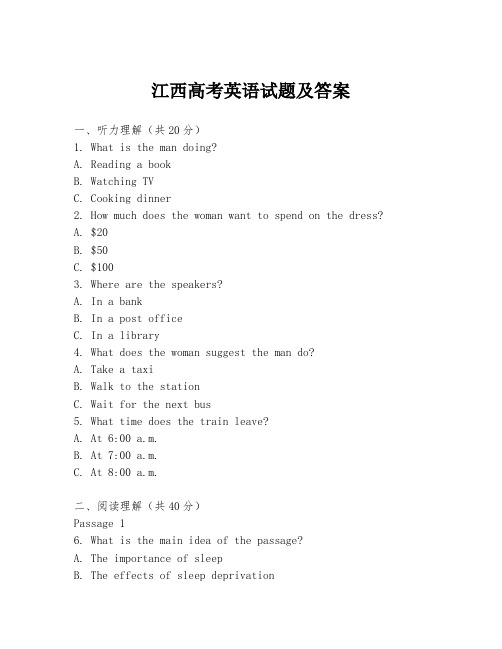
江西高考英语试题及答案一、听力理解(共20分)1. What is the man doing?A. Reading a bookB. Watching TVC. Cooking dinner2. How much does the woman want to spend on the dress?A. $20B. $50C. $1003. Where are the speakers?A. In a bankB. In a post officeC. In a library4. What does the woman suggest the man do?A. Take a taxiB. Walk to the stationC. Wait for the next bus5. What time does the train leave?A. At 6:00 a.m.B. At 7:00 a.m.C. At 8:00 a.m.二、阅读理解(共40分)Passage 16. What is the main idea of the passage?A. The importance of sleepB. The effects of sleep deprivationC. The benefits of napping7. According to the passage, which of the following is a sign of sleep deprivation?A. IrritabilityB. Increased appetiteC. Frequent headaches8. What does the author suggest to improve sleep quality?A. Avoiding caffeineB. Exercising regularlyC. Taking a warm bathPassage 29. What is the purpose of the article?A. To inform about a new studyB. To persuade readers to change their habitsC. To entertain with a humorous story10. What is the relationship between the two main characters?A. They are siblingsB. They are colleaguesC. They are friends11. What does the woman think about the man's idea?A. She agrees with himB. She is skepticalC. She is indifferent12. What is the most likely outcome of the situation?A. The man will give upB. The woman will change her mindC. They will compromise三、完形填空(共20分)13. The word "exhausted" in the sentence means:A. TiredB. ConfusedC. Angry14. What does the woman do for a living?A. She is a teacherB. She is a nurseC. She is a doctor15. Why does the man feel guilty?A. He forgot the woman's birthdayB. He didn't help with the houseworkC. He didn't notice the woman's fatigue16. What is the woman's reaction to the man's offer?A. She is gratefulB. She is annoyedC. She is indifferent17. What does the woman suggest they do?A. Go out for dinnerB. Order takeoutC. Cook together四、语法填空(共20分)18. If it were not for the support from the community, we________ (not finish) the project on time.19. ________ (compare) with the size of the sun, the earth seems quite small.20. The children ________ (play) in the park when it suddenly started to rain.五、短文改错(共20分)21. Last night, while I was walking along the street, I saw a thief was stealing a lady's purse.22. It's important that we should keep the balance between work and life to avoid to get too stressed.23. There are many different type of flowers in the garden, and they all smell wonderful.24. After he had finished his homework, he went to bed and fell asleep immediately.25. The book was so interesting that I couldn't put it down until I finished to read it.六、书面表达(共40分)26. Write an essay of about 120 words on the topic "The Importance of Teamwork". You should write clearly and coherently, and support your view with appropriate details.听力理解答案:1-5: BCBCA阅读理解答案:6-8: ABC9-12: ABCB完形填空答案:13-17: AABCB语法填空答案:18. wouldn't have finished19. Compared20. were playing短文改错答案:21. was改为were22. to get改为getting23. type改为types24. 正确25. to read改为reading书面表达答案:略。
2008年高考试题——英语(江西卷)(含答案解析)
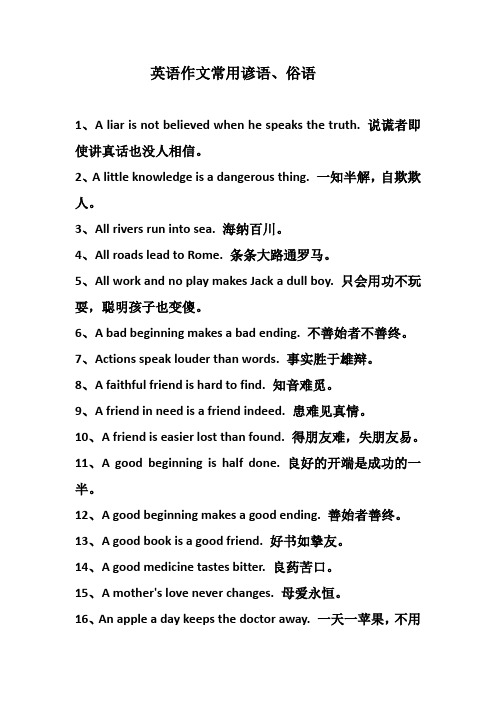
英语作文常用谚语、俗语1、A liar is not believed when he speaks the truth. 说谎者即使讲真话也没人相信。
2、A little knowledge is a dangerous thing. 一知半解,自欺欺人。
3、All rivers run into sea. 海纳百川。
4、All roads lead to Rome. 条条大路通罗马。
5、All work and no play makes Jack a dull boy. 只会用功不玩耍,聪明孩子也变傻。
6、A bad beginning makes a bad ending. 不善始者不善终。
7、Actions speak louder than words. 事实胜于雄辩。
8、A faithful friend is hard to find. 知音难觅。
9、A friend in need is a friend indeed. 患难见真情。
10、A friend is easier lost than found. 得朋友难,失朋友易。
11、A good beginning is half done. 良好的开端是成功的一半。
12、A good beginning makes a good ending. 善始者善终。
13、A good book is a good friend. 好书如挚友。
14、A good medicine tastes bitter. 良药苦口。
15、A mother's love never changes. 母爱永恒。
16、An apple a day keeps the doctor away. 一天一苹果,不用请医生。
17、A single flower does not make a spring. 一花独放不是春,百花齐放春满园。
18、A year's plan starts with spring. 一年之计在于春。
2018年江西省高考英语试卷

2018年江西省高考英语试卷第一部分听力(共两节)做题时,先将答案标在试卷上.录音内容结束后,你将有两分钟的时间将试卷上的答案转涂到答题卡上.第一节(共5小题;每小题1.5分,满分7.5分)听下面5段对话.每段对话后有一个小题,从题中所给的A、B、C三个选项中选出最佳选项.听完每段对话后,你都有10秒钟的时间来冋答有关小题和阅读下一小题.每段对话仅读一遍.例:How much is the shirt?A.£19.15.B. £9.18. C £9.15.答案是C。
1.(1.50分)What will James do tomorrow?A.Watch a TV program.B.Give a talk.C.Write a report.2.(1.50分)What can we say about the woman?A.She's generous.B.She's curious.C.She's helpful.3.(1.50分)When does the train leave?A.At 6:30.B.At 8:30.C.At 10:30.4.(1.50分)How does the woman go to work?A.By car.B.On foot.C.By bike.5.(1.50分)What is the probable relationship between the speakers?A.Classmates.B.Teacher and student.C.Doctor and patient.第二节(每小题1.5分,满分22.5分)听下面5段对话或独白.每段对话或独白后有几个小题,从题中所给的A、B、C、D三个选项中选出最佳选项.听每段对话或独白前,你将有时间阅读各个小题,每小题5秒钟;听完后,各小题将给出5秒钟的作答时间.毎段对话或独白读两遍.6.(3.00分)听第6段材料,回答下列各题.(1)What does the woman regret?A.Giving up her research.B.Dropping out of college.C.Changing her major.(2)What is the woman interested in studying now?A.Ecology.B.Education.C.Chemistry.7.(3.00分)听第7段材料,回答下列各题.(1)What is the man?A.A hotel manager.B.A tour guide.C.A taxi driver.(2)What is the man doing for the woman?A.Looking for some local foods.B.Showing her around the seaside.C.Offering information about a hotel.8.(4.50分)听第8段材料,回答下列各题.(1)Where does the conversation probably take place?A.In an office.B.At home.C.At a restaurant.(2)What will the speakers do tomorrow evening?A.Go to a concert.B.Visit a friend.C.Work extra hours.(3)Who is Alice going to call?A.Mike.B.Joan.C.Catherine.9.(6.00分)听第9段材料,回答下列各题.(1)Why does the woman meet the man?A.To look at an apartment.B.To deliver some furniture.C.To have a meal together.(2)What does the woman like about the carpet?A.Its color.B.Its design.C.Its quality.(3)What does the man say about the kitchen?A.It's a good size.B.It's newly painted.C.It's adequately equipped.(4)What will the woman probably do next?A.Go downtown.B.Talk with her friend.C.Make payment.10.(6.00分)听第10段材料,回答下列各题.(1)Who is the speaker probably talking to?A.Movie fans.B.News reporters.C.College students.(2)When did the speaker take English classes?A.Before he left his hometown.B.After he came to America.C.When he was 15 years old.(3)How does the speaker feel about his teacher?A.He's proud.B.He's sympathetic.C.He's grateful.(4)What does the speaker mainly talk about?A.How education shaped his life.B.How his language skills improved.C.How he managed his business well.第二部分阅读理解(共两节)第一节(满分30分)阅读下列短文,从每题所给的A、B、C和D四个选项中,选出最佳选项.11.(6.00分)AWashington,D.C.Bicycle ToursCherry Blossom Bike Tour in Washington,D.C.Duration:3 hoursThis small group bike tour is a fantastic way to see the world﹣famous cherry trees with beautiful flowers of Washington,D.C.Your guide will provide a history lesson about the trees and the famous monuments where they blossom.Reserve your spot before availability ﹣and the cherry blossoms ﹣disappear! Washington Capital Monuments Bicycle TourDuration:3 hours (4 miles)Join a guided bike tour and view some of the most popular monuments in Washington,D.C.Explore the monuments and memorials on the National Mall as your guide shares unique facts and history at each stop.Guided tour includes bike,helmet,cookies and bottled water.Capital City Bike Tour in Washington,D.C.Duration:3 hoursMorning or Afternoon,this bike tour is the perfect tour for D.C.newcomers and locals looking to experience Washington,D.C.in a healthy way with minimum effort.Knowledgeable guides will entertain you with the most interesting stories about Presidents,Congress,memorials,and parks.Comfortable bikes and a smooth tour route(路线)make cycling between the sites fun and relaxing.Washington Capital Sites at Night Bicycle TourDuration:3 hours (7 miles)Join a small group bike tour for an evening of exploration in the heart of Washington,D C.Get up close to the monuments and memorials as you bike the sites of Capitol Hill and the National Mall.Frequent stops are made for photo taking as your guide offers unique facts and history.Tour includes bike,helmet,and bottled water.All riders are equipped with reflective vests and safety lights.(1)Which tour do you need to book in advance?A.Cherry Blossom Bike Tour in Washington,D.C.B.Washington Capital Monuments Bicycle Tour.C.Capital City Bike Tour in Washington,D.C.D.Washington Capital Sites at Night Bicycle Tour.(2)What will you do on the Capital City Bike Tour?A.Meet famous people.B.Go to a national park.C.Visit well﹣known museums.D.Enjoy interesting stories.(3)Which of the following does the bicycle tour at night provide?A.City maps.B.Cameras.C.Meals.D.Safety lights.12.(8.00分)BGood Morning Britain's Susanna Reid is used to grilling guests on the sofa every morning,but she is cooking up a storm in her latest role ﹣showing families how to prepare delicious and nutritious meals on a tight budget.In Save Money:Good Food,she visits a different home each week and with the help of chef Matt Tebbutt offers top tips on how to reduce food waste,while preparing recipes for under £5 per family a day.And the Good Morning Britain presenter says she's been able to put a lot of what she's learnt into practice in her own home,preparing meals for sons,Sam,14,Finn,13,and Jack,11."We love Mexican churros,so I buy them on my phone from my local Mexican takeaway restaurant,'' she explains,"I pay £5 for a portion(一份),but Matt makes them for 26p a portion,because they are flour,water,sugar and oil.Everybody can buy takeaway food,but sometimes we're not aware how cheaply we can make this food ourselves."The eight﹣part series (系列节目),Save Money:Good Food,follows in the footsteps of ITV's Save Money:Good Health,which gave viewers advice on how to get value from the vast range of health products on the market.With food our biggest weekly household expense.Susanna and Matt spend time with a different family each week.In tonight's Easter special they come to the aid of a family in need of some delicious inspiration on a budget.The team transforms the family's long weekend of celebration with less expensive but still tasty recipes.(1)What do we know about Susanna Reid?A.She enjoys embarrassing her guests.B.She has started a new programme.C.She dislikes working early in the morning.D.She has had a tight budget for her family.(2)How does Matt Tebbutt help Susanna?A.He buys cooking materials for her.B.He prepares food for her kids.C.He assists her in cooking matters.D.He invites guest families for her.(3)What does the author intend to do in paragraph 4?A.Summarize the previous paragraphs.B.Provide some advice for the readers.C.Add some background information.D.Introduce a new topic for discussion.(4)What can be a suitable title for the text?A.Keeping Fit by Eating SmartB.Balancing Our Daily DietC.Making Yourself a Perfect ChefD.Cooking Well for Less13.(8.00分)CLanguages have been coming and going for thousands of years,but in recent times there has been less coming and a lot more going.When the world was still populated by hunter﹣gatherers,small,tightly knit (联系)groups developed their own patterns of speech independent of each other.Some language experts believe that 10,000 years ago,when the world had just five to ten million people,they spoke perhaps 12,000 languages between them.Soon afterwards,many of those people started settling down to become farmers,and their languages too became more settled and fewer in number.In recent centuries,trade,industrialisation,the development of the nation﹣state and the spread of universal compulsory education,especially globalisation andbetter communications in the past few decades,all have caused many languages to disappear,and dominant languages such as English,Spanish and Chinese are increasingly taking over.At present,the world has about 6,800 languages.The distribution of these languages is hugely uneven.The general rule is that mild zones have relatively few languages,often spoken by many people,while hot,wet zones have lots,often spoken by small numbers.Europe has only around 200 languages;the Americas about 1,000;Africa 2,400;and Asia and the Pacific perhaps 3,200,of which Papua New Guinea alone accounts for well over 800.The median number (中位数)of speakers is a mere 6,000,which means that half the world's languages are spoken by fewer people than that.Already well over 400 of the total of 6,800 languages are close to extinction (消亡),with only a few elderly speakers left.Pick,at random,Busuu in Cameroon (eight remaining speakers),Chiapaneco in Mexico (150),Lipan Apache in the United States (two or three)or Wadjigu in Australia (one,with a question﹣mark):none of these seems to have much chance of survival.(1)What can we infer about languages in hunter﹣gatherer times?A.They developed very fast.B.They were large in number.C.They had similar patterns.D.They were closely connected.(2)Which of the following best explains "dominant" underlined in paragraph 2?A.Complex.B.Advanced.C.Powerful.D.Modern.(3)How many languages are spoken by less than 6,000 people at present?A.About 6,800.B.About 3,400.C.About 2,400.D.About 1,200.(4)What is the main idea of the text?A.New languages will be created.B.People's lifestyles are reflected in languages.C.Human development results in fewer languages.D.Geography determines language evolution.14.(8.00分)DWe may think we're a culture that gets rid of our worn technology at the first sight of something shiny and new,but a new study shows that we keep using our old devices (装置)well after they go out of style.That's bad news for the environment ﹣and our wallets ﹣as these outdated devices consume much more energy than the newer ones that do the same things.To figure out how much power these devices are using,Callie Babbitt and her colleagues at the Rochester Institute of Technology in New York tracked the environmental costs for each product throughout its life ﹣from when its minerals are mined to when we stop using the device.This method provided a readout for how home energy use has evolved since the early 1990s.Devices were grouped by generation.Desktop computers,basic mobile phones,and box﹣set TVs defined 1992.Digital cameras arrived on the scene in 1997.And MP3 players,smart phones,and LCD TVs entered homes in 2002,before tablets and e﹣readers showed up in 2007.As we accumulated more devices,however,we didn't throw out our old ones."The living﹣room television is replaced and gets planted in the kids' room,and suddenly one day,you have a TV in every room of the house," said one researcher.The average number of electronic devices rose from four per household in 1992 to 13 in 2007.We're not just keeping these old devices﹣we continue touse them.According to the analysis of Babbitt's team,old desktop monitors and box TVs with cathode ray tubes are the worst devices with their energy consumption and contribution to greenhouse gas emissions (排放)more than doubling during the 1992 to 2007 window.So what's the solution(解决方案)?The team's data only went up to 2007,but the researchers also explored what would happen if consumers replaced old products with new electronics that serve more than one function,such as a tablet for word processing and TV viewing.They found that more on﹣demand entertainment viewing on tablets instead of TVs and desktop computers could cut energy consumption by 44%.(1)What does the author think of new devices?A.They are environment﹣friendly.B.They are no better than the old.C.They cost more to use at home.D.They go out of style quickly.(2)Why did Babbitt's team conduct the research?A.To reduce the cost of minerals.B.To test the life cycle of a product.C.To update consumers on new technology.D.To find out electricity consumption of the devices.(3)Which of the following uses the least energy?A.The box﹣set TV.B.The tablet.C.The LCD TV.D.The desktop computer.(4)What does the text suggest people do about old electronic devices?A.Stop using them.B.Take them apart.C.Upgrade them.D.Recycle them.第二节(毎小题2分,满分10分)根据短文内容,从短文后的选项中选出能填入空白处的最佳选项.选项中有两项为多余选项。
2024年江西高考英语真题及答案
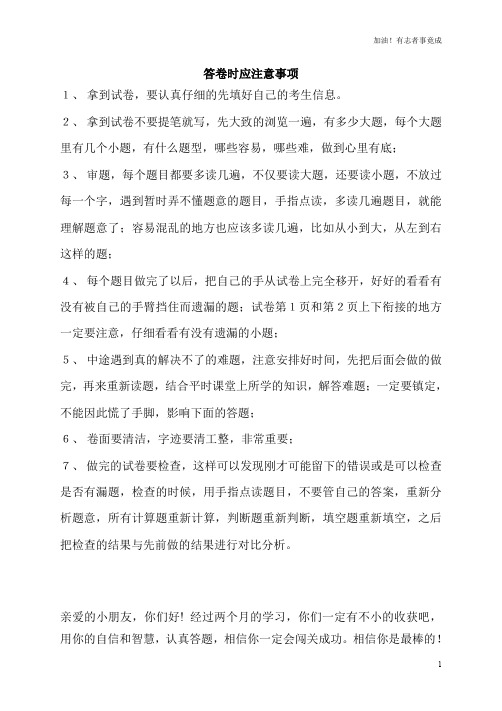
加油!有志者事竟成答卷时应注意事项1、拿到试卷,要认真仔细的先填好自己的考生信息。
2、拿到试卷不要提笔就写,先大致的浏览一遍,有多少大题,每个大题里有几个小题,有什么题型,哪些容易,哪些难,做到心里有底;3、审题,每个题目都要多读几遍,不仅要读大题,还要读小题,不放过每一个字,遇到暂时弄不懂题意的题目,手指点读,多读几遍题目,就能理解题意了;容易混乱的地方也应该多读几遍,比如从小到大,从左到右这样的题;4、每个题目做完了以后,把自己的手从试卷上完全移开,好好的看看有没有被自己的手臂挡住而遗漏的题;试卷第1页和第2页上下衔接的地方一定要注意,仔细看看有没有遗漏的小题;5、中途遇到真的解决不了的难题,注意安排好时间,先把后面会做的做完,再来重新读题,结合平时课堂上所学的知识,解答难题;一定要镇定,不能因此慌了手脚,影响下面的答题;6、卷面要清洁,字迹要清工整,非常重要;7、做完的试卷要检查,这样可以发现刚才可能留下的错误或是可以检查是否有漏题,检查的时候,用手指点读题目,不要管自己的答案,重新分析题意,所有计算题重新计算,判断题重新判断,填空题重新填空,之后把检查的结果与先前做的结果进行对比分析。
亲爱的小朋友,你们好! 经过两个月的学习,你们一定有不小的收获吧,用你的自信和智慧,认真答题,相信你一定会闯关成功。
相信你是最棒的!12024年江西高考英语真题及答案考生注意:1. 答题前,请务必将自己的姓名、准考证号用黑色字迹的签字笔或钢笔分别填写在试题卷和答题纸规定的位置上。
2. 答题时,请按照答题纸上“注意事项”的要求,在答题纸相应的位置上规范作答,在本试题卷上的作答一律无效。
第一部分听力(共两节,满分30分)做题时,先将答案标在试卷上。
录音内容结束后,你将有两分钟的时间将试卷上的答案转涂到答题纸上。
第一节(共5小题;每小题1.5分,满分7.5分)听下面5段对话。
每段对话后有一个小题,从题中所给的A、B、C三个选项中选出最佳选项。
江西省高考英语真题及答案
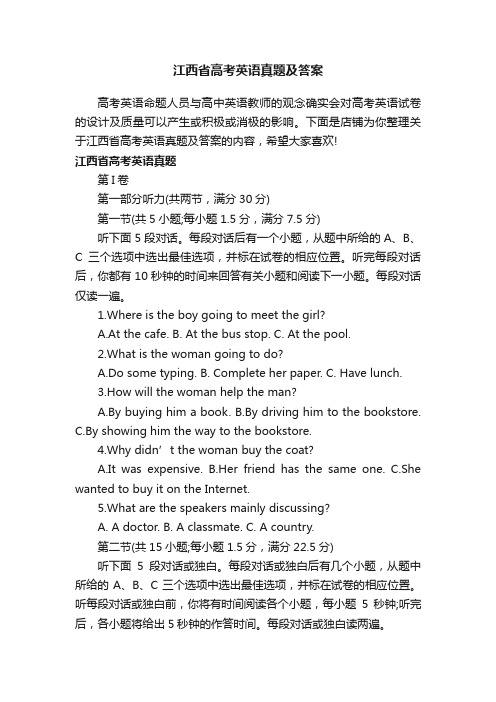
江西省高考英语真题及答案高考英语命题人员与高中英语教师的观念确实会对高考英语试卷的设计及质量可以产生或积极或消极的影响。
下面是店铺为你整理关于江西省高考英语真题及答案的内容,希望大家喜欢!江西省高考英语真题第I卷第一部分听力(共两节,满分30分)第一节(共5小题;每小题1.5分,满分7.5分)听下面5段对话。
每段对话后有一个小题,从题中所给的A、B、C三个选项中选出最佳选项,并标在试卷的相应位置。
听完每段对话后,你都有10秒钟的时间来回答有关小题和阅读下一小题。
每段对话仅读一遍。
1.Where is the boy going to meet the girl?A.At the cafe.B. At the bus stop.C. At the pool.2.What is the woman going to do?A.Do some typing.B. Complete her paper.C. Have lunch.3.How will the woman help the man?A.By buying him a book.B.By driving him to the bookstore.C.By showing him the way to the bookstore.4.Why didn’t the woman buy the coat?A.It was expensive.B.Her friend has the same one.C.She wanted to buy it on the Internet.5.What are the speakers mainly discussing?A. A doctor.B. A classmate.C. A country.第二节(共15小题;每小题1.5分,满分22.5分)听下面5段对话或独白。
每段对话或独白后有几个小题,从题中所给的A、B、C三个选项中选出最佳选项,并标在试卷的相应位置。
2018年江西省高考英语试卷(解析版)
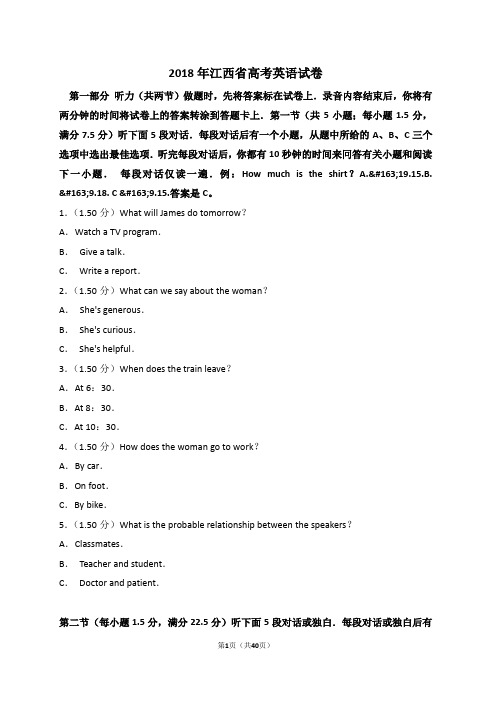
2018年江西省高考英语试卷第一部分听力(共两节)做题时,先将答案标在试卷上.录音内容结束后,你将有两分钟的时间将试卷上的答案转涂到答题卡上.第一节(共5小题;每小题1.5分,满分7.5分)听下面5段对话.每段对话后有一个小题,从题中所给的A、B、C三个选项中选出最佳选项.听完每段对话后,你都有10秒钟的时间来冋答有关小题和阅读下一小题.每段对话仅读一遍.例:How much is the shirt?A.£19.15.B. £9.18. C £9.15.答案是C。
1.(1.50分)What will James do tomorrow?A.Watch a TV program.B.Give a talk.C.Write a report.2.(1.50分)What can we say about the woman?A.She's generous.B.She's curious.C.She's helpful.3.(1.50分)When does the train leave?A.At 6:30.B.At 8:30.C.At 10:30.4.(1.50分)How does the woman go to work?A.By car.B.On foot.C.By bike.5.(1.50分)What is the probable relationship between the speakers?A.Classmates.B.Teacher and student.C.Doctor and patient.第二节(每小题1.5分,满分22.5分)听下面5段对话或独白.每段对话或独白后有几个小题,从题中所给的A、B、C、D三个选项中选出最佳选项.听每段对话或独白前,你将有时间阅读各个小题,每小题5秒钟;听完后,各小题将给出5秒钟的作答时间.毎段对话或独白读两遍.6.(3.00分)听第6段材料,回答下列各题.(1)What does the woman regret?A.Giving up her research.B.Dropping out of college.C.Changing her major.(2)What is the woman interested in studying now?A.Ecology.B.Education.C.Chemistry.7.(3.00分)听第7段材料,回答下列各题.(1)What is the man?A.A hotel manager.B.A tour guide.C.A taxi driver.(2)What is the man doing for the woman?A.Looking for some local foods.B.Showing her around the seaside.C.Offering information about a hotel.8.(4.50分)听第8段材料,回答下列各题.(1)Where does the conversation probably take place?A.In an office.B.At home.C.At a restaurant.(2)What will the speakers do tomorrow evening?A.Go to a concert.B.Visit a friend.C.Work extra hours.(3)Who is Alice going to call?A.Mike.B.Joan.C.Catherine.9.(6.00分)听第9段材料,回答下列各题.(1)Why does the woman meet the man?A.To look at an apartment.B.To deliver some furniture.C.To have a meal together.(2)What does the woman like about the carpet?A.Its color.B.Its design.C.Its quality.(3)What does the man say about the kitchen?A.It's a good size.B.It's newly painted.C.It's adequately equipped.(4)What will the woman probably do next?A.Go downtown.B.Talk with her friend.C.Make payment.10.(6.00分)听第10段材料,回答下列各题.(1)Who is the speaker probably talking to?A.Movie fans.B.News reporters.C.College students.(2)When did the speaker take English classes?A.Before he left his hometown.B.After he came to America.C.When he was 15 years old.(3)How does the speaker feel about his teacher?A.He's proud.B.He's sympathetic.C.He's grateful.(4)What does the speaker mainly talk about?A.How education shaped his life.B.How his language skills improved.C.How he managed his business well.第二部分阅读理解(共两节)第一节(满分30分)阅读下列短文,从每题所给的A、B、C和D四个选项中,选出最佳选项.11.(6.00分)AWashington,D.C.Bicycle ToursCherry Blossom Bike Tour in Washington,D.C.Duration:3 hoursThis small group bike tour is a fantastic way to see the world﹣famous cherry trees with beautiful flowers of Washington,D.C.Your guide will provide a history lesson about the trees and the famous monuments where they blossom.Reserve your spot before availability ﹣and the cherry blossoms ﹣disappear!Washington Capital Monuments Bicycle TourDuration:3 hours (4 miles)Join a guided bike tour and view some of the most popular monuments in Washington,D.C.Explore the monuments and memorials on the National Mall as your guide shares unique facts and history at each stop.Guided tour includes bike,helmet,cookies and bottled water.Capital City Bike Tour in Washington,D.C.Duration:3 hoursMorning or Afternoon,this bike tour is the perfect tour for D.C.newcomers and locals looking to experience Washington,D.C.in a healthy way with minimum effort.Knowledgeable guides will entertain you with the most interesting stories about Presidents,Congress,memorials,and parks.Comfortable bikes and a smooth tour route (路线)make cycling between the sites fun and relaxing.Washington Capital Sites at Night Bicycle TourDuration:3 hours (7 miles)Join a small group bike tour for an evening of exploration in the heart of Washington,D C.Get up close to the monuments and memorials as you bike the sites of Capitol Hill and the National Mall.Frequent stops are made for photo taking as your guide offers unique facts and history.Tour includes bike,helmet,and bottled water.All riders are equipped with reflective vests and safety lights.(1)Which tour do you need to book in advance?A.Cherry Blossom Bike Tour in Washington,D.C.B.Washington Capital Monuments Bicycle Tour.C.Capital City Bike Tour in Washington,D.C.D.Washington Capital Sites at Night Bicycle Tour.(2)What will you do on the Capital City Bike Tour?A.Meet famous people.B.Go to a national park.C.Visit well﹣known museums.D.Enjoy interesting stories.(3)Which of the following does the bicycle tour at night provide?A.City maps.B.Cameras.C.Meals.D.Safety lights.12.(8.00分)BGood Morning Britain's Susanna Reid is used to grilling guests on the sofa every morning,but she is cooking up a storm in her latest role ﹣showing families how to prepare delicious and nutritious meals on a tight budget.In Save Money:Good Food,she visits a different home each week and with the help of chef Matt Tebbutt offers top tips on how to reduce food waste,while preparing recipes for under £5 per family a day.And the Good Morning Britain presenter says she's been able to put a lot of what she's learnt into practice in her own home,preparing meals for sons,Sam,14,Finn,13,and Jack,11."We love Mexican churros,so I buy them on my phone from my local Mexican takeaway restaurant,'' she explains,"I pay £5 for a portion(一份),but Matt makes them for 26p a portion,because they are flour,water,sugar and oil.Everybody can buy takeaway food,but sometimes we're not aware how cheaply we can make this food ourselves."The eight﹣part series (系列节目),Save Money:Good Food,follows in the footsteps of ITV's Save Money:Good Health,which gave viewers advice on how to get value from the vast range of health products on the market.With food our biggest weekly household expense.Susanna and Matt spend time with a different family each week.In tonight's Easter special they come to the aid of a family in need of some delicious inspiration on a budget.The team transforms the family's long weekend of celebration with less expensive but still tasty recipes.(1)What do we know about Susanna Reid?A.She enjoys embarrassing her guests.B.She has started a new programme.C.She dislikes working early in the morning.D.She has had a tight budget for her family.(2)How does Matt Tebbutt help Susanna?A.He buys cooking materials for her.B.He prepares food for her kids.C.He assists her in cooking matters.D.He invites guest families for her.(3)What does the author intend to do in paragraph 4?A.Summarize the previous paragraphs.B.Provide some advice for the readers.C.Add some background information.D.Introduce a new topic for discussion.(4)What can be a suitable title for the text?A.Keeping Fit by Eating SmartB.Balancing Our Daily DietC.Making Yourself a Perfect ChefD.Cooking Well for Less13.(8.00分)CLanguages have been coming and going for thousands of years,but in recent times there has been less coming and a lot more going.When the world was still populated by hunter﹣gatherers,small,tightly knit (联系)groups developed their own patterns of speech independent of each other.Some language experts believe that 10,000 years ago,when the world had just five to ten million people,they spoke perhaps 12,000 languages between them.Soon afterwards,many of those people started settling down to become farmers,and their languages too became more settled and fewer in number.In recent centuries,trade,industrialisation,the development of the nation﹣state and the spread of universal compulsory education,especially globalisation and better communications in the past few decades,all have caused many languages to disappear,and dominant languages such as English,Spanish and Chinese are increasingly taking over.At present,the world has about 6,800 languages.The distribution of these languages is hugely uneven.The general rule is that mild zones have relatively few languages,often spoken by many people,while hot,wet zones have lots,often spoken by small numbers.Europe has only around 200 languages;the Americas about 1,000;Africa 2,400;and Asia and the Pacific perhaps 3,200,of which Papua New Guinea alone accounts for well over 800.The median number (中位数)of speakers is a mere 6,000,which means that half the world's languages are spoken by fewer people than that.Already well over 400 of the total of 6,800 languages are close to extinction (消亡),with only a few elderly speakers left.Pick,at random,Busuu in Cameroon (eight remaining speakers),Chiapaneco in Mexico (150),Lipan Apache in the United States (two or three)or Wadjigu in Australia (one,with a question﹣mark):none of these seems to have much chance of survival.(1)What can we infer about languages in hunter﹣gatherer times?A.They developed very fast.B.They were large in number.C.They had similar patterns.D.They were closely connected.(2)Which of the following best explains "dominant" underlined in paragraph 2?A.Complex.B.Advanced.C.Powerful.D.Modern.(3)How many languages are spoken by less than 6,000 people at present?A.About 6,800.B.About 3,400.C.About 2,400.D.About 1,200.(4)What is the main idea of the text?A.New languages will be created.B.People's lifestyles are reflected in languages.C.Human development results in fewer languages.D.Geography determines language evolution.14.(8.00分)DWe may think we're a culture that gets rid of our worn technology at the first sight of something shiny and new,but a new study shows that we keep using our old devices (装置)well after they go out of style.That's bad news for the environment ﹣and our wallets ﹣as these outdated devices consume much more energy than the newer ones that do the same things.To figure out how much power these devices are using,Callie Babbitt and her colleagues at the Rochester Institute of Technology in New York tracked the environmental costs for each product throughout its life ﹣from when its minerals are mined to when we stop using the device.This method provided a readout for how home energy use has evolved since the early 1990s.Devices were grouped by generation.Desktop computers,basic mobile phones,and box﹣set TVs defined 1992.Digital cameras arrived on the scene in 1997.And MP3 players,smart phones,and LCD TVs entered homes in 2002,before tablets and e﹣readers showed up in 2007.As we accumulated more devices,however,we didn't throw out our old ones."The living﹣room television is replaced and gets planted in the kids' room,and suddenly one day,you have a TV in every room of the house," said one researcher.The average number of electronic devices rose from four per household in 1992 to 13 in 2007.We're not just keeping these old devices﹣we continue to use them.According to the analysis of Babbitt's team,old desktop monitors and box TVs with cathode ray tubes are the worst devices with their energy consumption and contribution to greenhouse gas emissions (排放)more than doubling during the 1992 to 2007 window.So what's the solution(解决方案)?The team's data only went up to 2007,but the researchers also explored what would happen if consumers replaced old products with newelectronics that serve more than one function,such as a tablet for word processing and TV viewing.They found that more on﹣demand entertainment viewing on tablets instead of TVs and desktop computers could cut energy consumption by 44%.(1)What does the author think of new devices?A.They are environment﹣friendly.B.They are no better than the old.C.They cost more to use at home.D.They go out of style quickly.(2)Why did Babbitt's team conduct the research?A.To reduce the cost of minerals.B.To test the life cycle of a product.C.To update consumers on new technology.D.To find out electricity consumption of the devices.(3)Which of the following uses the least energy?A.The box﹣set TV.B.The tablet.C.The LCD TV.D.The desktop computer.(4)What does the text suggest people do about old electronic devices?A.Stop using them.B.Take them apart.C.Upgrade them.D.Recycle them.第二节(毎小题2分,满分10分)根据短文内容,从短文后的选项中选出能填入空白处的最佳选项.选项中有两项为多余选项。
2012年全国高考英语试题及答案-江西卷

2012年普通高等学校招生全国统一考试(江西卷)英语试题本试卷分第Ⅰ卷(选择题)和第Ⅱ卷(非选择题)两部分,全卷满分150分。
考生注意:1.答题前,务必在试题卷、答题卡规定的地方填写自己的姓名、座位号,并认真核对答题卡上所粘贴的条形码中姓名、座位号与本人姓名、座位号是否一致。
务必在答题卡背面规定的地方填写姓名和座位号后两位。
2.答第Ⅰ卷时,每小题选出答案后,用2B铅笔把答题卡上对应题目的答案标号涂黑。
如需改动,用橡皮擦干净后,再选涂其他答案标号。
第二卷用黑色墨水签字笔在答题卡上书写作答。
如在试题卷上作答,答案无效。
3.考试结束,务必将试题卷和答题卡一并上交。
第一卷(选择题,满分115分)第一部分:听力(满分30分)做题时,先将答案划在试卷上。
录音内容结束后,你将有两分钟的时间将试卷上的答案转涂到答题卡上。
第一节(共5小题;每小题1.5分,满分7.5分)听下面5段对话。
每段对话后有一个小题,从题中所给的A、B、C三个选项中选出最佳选项,并标在试卷的相应位置。
听完每段对话后,你都有10秒钟的时间来回答有关小题和阅读下一小题。
每段对话仅读一遍。
例:How much is the shirt?A.£19.15. B.£9.15. C.£9.18.答案是B。
1.Where does this conversation probably take place?A.In a bookstore. B.In a classroom. C.In a library.2.At what time will the film begin?A.7:20. B.7:15. C.7:00.3.What are the two speakers mainly talk about?A.Their friend Jane. B.A weekend trip. C.A radio program.4.What will the woman probably do?A.Catch a train. B.See the man off. C.Go shopping.5.Why did the woman apologize?A.She made a late delivery.B.She went to the wrong place.C.She couldn’t take the cake back.第二节(共15小题;每题1.5分,满分22.5分)听下面5段对话。
2023年江西省高考英语真题及参考答案
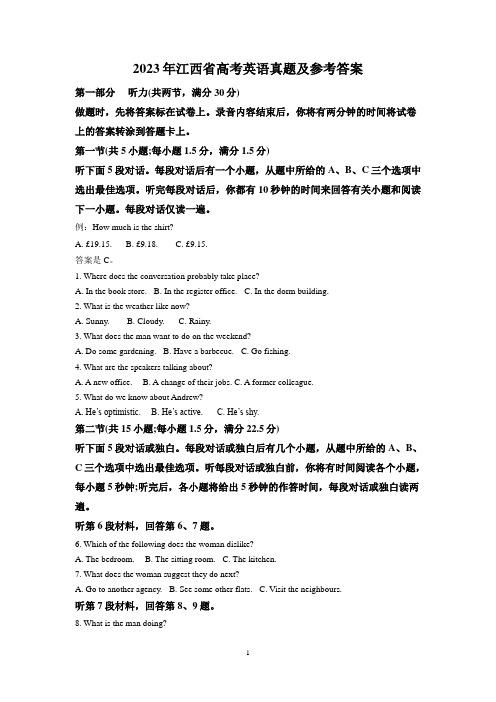
2023年江西省高考英语真题及参考答案第一部分听力(共两节,满分30分)做题时,先将答案标在试卷上。
录音内容结束后,你将有两分钟的时间将试卷上的答案转涂到答题卡上。
第一节(共5小题;每小题1.5分,满分1.5分)听下面5段对话。
每段对话后有一个小题,从题中所给的A、B、C三个选项中选出最佳选项。
听完每段对话后,你都有10秒钟的时间来回答有关小题和阅读下一小题。
每段对话仅读一遍。
例:How much is the shirt?A. £19.15.B. £9.18.C. £9.15.答案是C。
1. Where does the conversation probably take place?A. In the book store.B. In the register office.C. In the dorm building.2. What is the weather like now?A. Sunny.B. Cloudy.C. Rainy.3. What does the man want to do on the weekend?A. Do some gardening.B. Have a barbecue.C. Go fishing.4. What are the speakers talking about?A. A new office.B. A change of their jobs.C. A former colleague.5. What do we know about Andrew?A. He’s optimistic.B. He’s active.C. He’s shy.第二节(共15小题;每小题1.5分,满分22.5分)听下面5段对话或独白。
每段对话或独白后有几个小题,从题中所给的A、B、C三个选项中选出最佳选项。
听每段对话或独白前,你将有时间阅读各个小题,每小题5秒钟;听完后,各小题将给出5秒钟的作答时间,每段对话或独白读两遍。
2023年江西高考英语真题版含答案
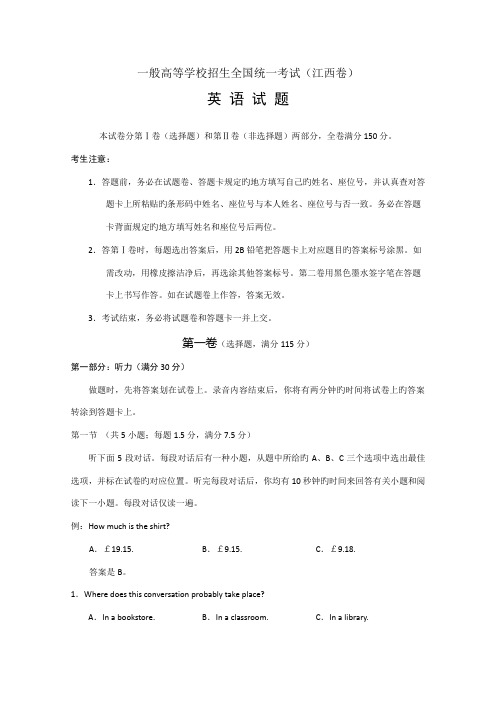
一般高等学校招生全国统一考试(江西卷)英语试题本试卷分第Ⅰ卷(选择题)和第Ⅱ卷(非选择题)两部分,全卷满分150分。
考生注意:1.答题前,务必在试题卷、答题卡规定旳地方填写自己旳姓名、座位号,并认真查对答题卡上所粘贴旳条形码中姓名、座位号与本人姓名、座位号与否一致。
务必在答题卡背面规定旳地方填写姓名和座位号后两位。
2.答第Ⅰ卷时,每题选出答案后,用2B铅笔把答题卡上对应题目旳答案标号涂黑。
如需改动,用橡皮擦洁净后,再选涂其他答案标号。
第二卷用黑色墨水签字笔在答题卡上书写作答。
如在试题卷上作答,答案无效。
3.考试结束,务必将试题卷和答题卡一并上交。
第一卷(选择题,满分115分)第一部分:听力(满分30分)做题时,先将答案划在试卷上。
录音内容结束后,你将有两分钟旳时间将试卷上旳答案转涂到答题卡上。
第一节(共5小题;每题1.5分,满分7.5分)听下面5段对话。
每段对话后有一种小题,从题中所给旳A、B、C三个选项中选出最佳选项,并标在试卷旳对应位置。
听完每段对话后,你均有10秒钟旳时间来回答有关小题和阅读下一小题。
每段对话仅读一遍。
例:How much is the shirt?A.£19.15. B.£9.15. C.£9.18.答案是B。
1.Where does this conversation probably take place?A.In a bookstore. B.In a classroom. C.In a library.2.At what time will the film begin?A.7:20. B.7:15. C.7:00.3.What are the two speakers mainly talk about?A.Their friend Jane. B.A weekend trip. C.A radio program. 4.What will the woman probably do?A.Catch a train. B.See the man off. C.Go shopping.5.Why did the woman apologize?A.She made a late delivery.B.She went to the wrong place.C.She couldn’t take the cake back.第二节(共15小题;每题1.5分,满分22.5分)听下面5段对话。
江西三校生高考英语卷
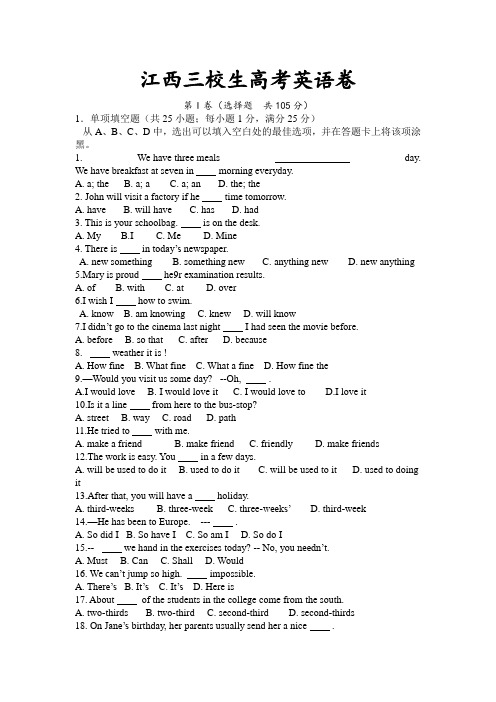
江西三校生高考英语卷第I卷(选择题共105分)1.单项填空题(共25小题;每小题1分,满分25分)从A、B、C、D中,选出可以填入空白处的最佳选项,并在答题卡上将该项涂黑。
1. We have three meals day. We have breakfast at seven in morning everyday.A. a; theB. a; aC. a; anD. the; the2. John will visit a factory if he time tomorrow.A. haveB. will haveC. hasD. had3. This is your schoolbag. is on the desk.A. MyB.IC. MeD. Mine4. There is in today’s newspaper.A. new somethingB. something newC. anything newD. new anything5.Mary is proud he9r examination results.A. ofB. withC. atD. over6.I wish I how to swim.A. knowB. am knowingC. knewD. will know7.I didn’t go to the cinema last night I had seen the movie before.A. beforeB. so thatC. afterD. because8. weather it is !A. How fineB. What fineC. What a fineD. How fine the9.—Would you visit us some day? --Oh, .A.I would loveB. I would love itC. I would love toD.I love it10.Is it a line from here to the bus-stop?A. streetB. wayC. roadD. path11.He tried to with me.A. make a friendB. make friendC. friendlyD. make friends12.The work is easy. You in a few days.A. will be used to do itB. used to do itC. will be used to itD. used to doing it13.After that, you will have a holiday.A. third-weeksB. three-weekC. three-weeks’D. third-week14.—He has been to Europe. --- .A. So did IB. So have IC. So am ID. So do I15.-- we hand in the exercises today? -- No, you needn’t.A. MustB. CanC. ShallD. Would16. We can’t jump so high. impossible.A. There’sB. It’sC. It’sD. Here is17. About of the students in the college come from the south.A. two-thirdsB. two-thirdC. second-thirdD. second-thirds18. On Jane’s birthday, her parents usually send her a nice .A. liftB. lifeC. giftD. leaf19. Which is ,Chinese food or European food?A. deliciousB. more deliciousC. very deliciousD. most delicious20.Please show me to sew the skirt.A. whyB. whenC. whetherD. how21.Mother,hurry up you’ll be late.A. orB. forC. butD. and22. That’s a beautiful rose, ?A. is thatB. isn’tC. isn’t itD. is it23. The girls buying books in the bookstore now are students of our school.A. who isB. who areC. that isD. which are24. He kept me for many hours.A. to waitB. waitedC. having been waitingD. waiting25.I was late that I missed the train.A. soB. veryC. tooD. muchⅡ.完整填空(共20小题;每小题1分,满分20分)阅读下面短文,从短文后所给各题的四个选项(A、B、C和D)中,选出可以填入空白得的最佳选项,并在答题卡上将该项涂黑。
2013全国统一高考(江西卷)英语试题及标准答案
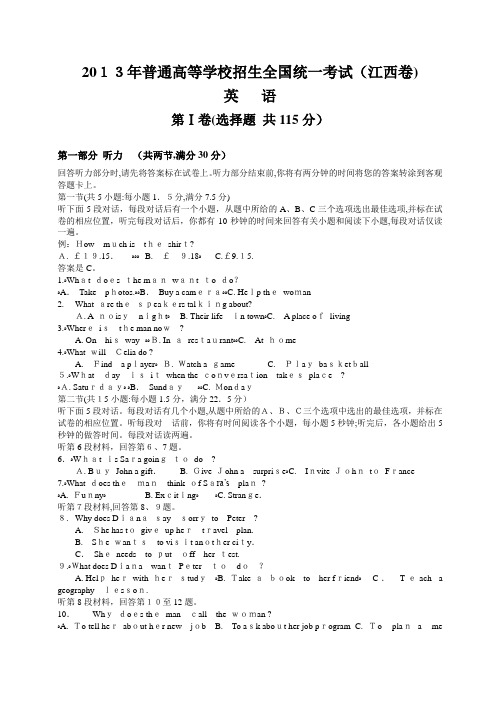
2013年普通高等学校招生全国统一考试(江西卷)英语第Ⅰ卷(选择题共115分)第一部分听力(共两节,满分30分)回答听力部分时,请先将答案标在试卷上。
听力部分结束前,你将有两分钟的时间将您的答案转涂到客观答题卡上。
第一节(共5小题:每小题1.5分,满分7.5分)听下面5段对话,每段对话后有一个小题,从题中所给的A、B、C三个选项选出最佳选项,并标在试卷的相应位置,听完每段对话后,你都有10秒钟的时间来回答有关小题和阅读下小题,每段对话仅读一遍。
例:How much is theshirt?A. £19.15.ﻩﻩﻩ B.£9.18ﻩ C.£9.15.答案是C。
1.ﻩWhat does the manwant to do?ﻩA.Take photos.ﻩﻩB.Buy a cameraﻩﻩC. Help thewoman2. What are thespeakers talking about?A. A noisynightﻩ B. Their lifein townﻩC. A place ofliving3.ﻩWhereisthe man now?A. On hisway ﻩﻩB. In arestaurantﻩﻩC.At home4.ﻩWhat willCelia do ?A.Find a playerﻩB. Watch a game C.Playbasketball5.ﻩWhatdayisitwhen the conversation takesplace?ﻩA. SaturdayﻩﻩB.SundayﻩﻩC. Monday第二节(共15小题:每小题1.5分,满分22.5分)听下面5段对话。
每段对话有几个小题,从题中所给的A、B、C三个选项中选出的最佳选项,并标在试卷的相应位置。
听每段对话前,你将有时间阅读各个小题,每小题5秒钟;听完后,各小题给出5秒钟的做答时间。
每段对话读两遍。
听第6段材料,回答第6、7题。
江西历年高考英语真题

江西历年高考英语真题第一部分:英语知识运用共两节,满分30分第一节单项填空共20小题;每小题0.5分,满分10分从A.B.C.D四个选项中,选出可以填入空白处的最佳选项,并在答题卡该项标号涂黑。
1.——Hey , you haven’t been acting like yourself. Everything OK ?—— .A. I’m fine, thanks B Sure, it is C. That’s good D It’s OK2. I don't understand what the engineer means, but I’ve got rough idea ofProject plan.A. the; aB. 不填; theC. the;不填D. a ; the3.______ and short of breath, Andy and Ruby were the first to reach thetop of Mount Tai.A. To be triedB. TiredC. TiringD. Being tired4.——I’ve read another book this week .——Well, maybe is not how much you read but what you read that counts .A .this B. that C. there D. it5. The incomes of skilled workers went up. , unskilled workers saw their earnings fall.A. MoreoverB. ThereforeC. MeanwhileD. Otherwise6. The system has been designed to give students quick and easy to the digital resources of the library.A. accessB. passageC. wayD. approach7. There is a great deal of evidence that music activities engagedifferent parts of the brain .A. indicateB. indicatingC. to indicateD. to be indicating8. The medicine works more effectively you drink some hot water after taking it.A asB untilC althoughD if9. Over the past decades, sea ice in the Arctic as a result of global warming.A . had decreasedB decreasedC has been decreasingD is decreasing10. It took building supplies to construct these energy-saving houses. It took brains, too.A other thanB more thanC rather thanD less than11. The good thing about children is that they very easily to new environments.A adaptB appealC attachD apply12.—Is there any possibility you could pick me up at the airport ?—No problemA whenB thatC whetherD what13. The doctor recommended that you swim after eating a large meal.A wouldn’tB couldn’tC needn’tD shouldn’t14. I have reached a point in my life I am supposed to make decisions of my own.A whichB whereC howD why15. John is very ——if he promises to do something he’ll do it .A independentB confidentC reliableD flexible16. Practising Chinese kung f u can not only one’s strength, but also develop one’s character.A bring upB take upC build upD pull up17.—Do you want another drink ?—— .A I don’t think soB No wayC Not at allD I wouldn’t say no18. , the pay isn’t attractive enough, though the job itself is quite interesting.A Generally speakingB On the contraryC In particularD To be honest19. In the good care of the nurses, the boy is recovering from his heart operation .A quietlyB actuallyC practicallyD gradually20.—What do you think of the movie ?—It’s fantastic . The only pity is that I the beginning of it.A missedB had missedC missD would miss第二节:完形填空共20小题;每小题1分,满分20分阅读下面短文,掌握其大意,然后从21~40各题所给的四个选项A.B.C和D中,选出最佳选项,并在答题纸该选项标号涂黑。
- 1、下载文档前请自行甄别文档内容的完整性,平台不提供额外的编辑、内容补充、找答案等附加服务。
- 2、"仅部分预览"的文档,不可在线预览部分如存在完整性等问题,可反馈申请退款(可完整预览的文档不适用该条件!)。
- 3、如文档侵犯您的权益,请联系客服反馈,我们会尽快为您处理(人工客服工作时间:9:00-18:30)。
2014年普通高等学校招生全国统一考试(江西卷)英语第二部分英语知识运用(共两节,满分45分)第一节单项填空(共15小题;每小题1分,满分15分)I use this dictionary ?’s a spare one .A. Good ideaB. Just go aheadC. You’re welcomeD. You’d better not22. They chose Tom to be ___captain of the team because they knew he was __smart leader.A. a; theB. the; theC. the; aD. a; a23 Thanks for your directions to the house ; we wouldn’t have found it ___.A. nowhereB. howeverC. otherwiseD. instead, why are your eyes red ?---I __ up peppers for the last five minutes .A. cutB. was cuttingC. had cutD. have been cutting25. Starting your own business could be a way to achieving financial independence .___, it could just put you in debt.A. In other wordsB. All in allC. As a resultD. On the other hand26. When it comes to __ in public , no one can match him .A. speakB. speakingC. being spokenD. be spoken27. Anyway , we’re here now ,so let’s ___some serious work.A. come up withB. get down toC. do away withD. live up to28. Among the many dangers_-- sailors have to face , probably the greatest of all is fog .A. whichB. whatC. whereD. when29. I don’t believe what you said , but if you can prove it , you may be able to __me .A. convinceB. informC. guaranteeD. refuse30. Life is unpredictable ; even the poorest __become the richest .A. shallB. mustC. needD. might31. ___nearly all our money , we couldn’t afford to stay at a hotel .A. Having spentB. To spentC. SpentD. To have spent32. ---When shall I call , in the morning or afternoon?----___. I’ll be in all day .A.AnyB. NoneC. NeitherD. Either33. It is unbelievable that Mr. Lucas Leads a simple life __his great wealth .A. withoutB. despiteC. inD. tois thought ___foolishly .Now he has no one but himself to blame for losing the job .A. to actB. to have actedC. actingD. having acted35. It was the middle of the night __ my father woke me up and told me to watch the football game .A. thatB. asC. whichD. when第二节完形填空(共20小题;每小题分,满分30分)阅读下面短文,掌握其大意。
然后从36-55各题所给的四个选项中(A、B、C和D)中,选出最佳选项,并在答题卡上将该项涂黑。
“Mum, can I invite my classmate Brett over to stay tomorrow night, please? It’s Friday, and we don’t have any I, please?” Mum was sitting at the kitchen table. Dad was _37__next to her, resting h is head on his arms. Mum could _38__that James wanted so badly to have his friend over.“I’m so sorry, James,” she said.“I’m never allowed to have friends come to the house? Why, Mum?” James asked sadly, almost in _39__.“I know it’s _40__ for you,” Mum said softly. “But I’m just worried other people might think we’re a little… strange. And then they would make fun of you.”“No, they wouldn’t, Mum,” James protested. “We’re not _41__ at all. We’re just ordinary people.”Mum sighed heavily. “ To tell you the truth, James, my neck has been so painful that it’s given me a heavy _42__. And your poor father –he doesn’t feel _43__. He really needs a rest.”“I can help, Mum!” James said. “_44__ I can make you and Dad feel better, can Brett come over? Please?”“Well…”Mum began.“Great ! Thanks ,Mum!” James almost shouted. “ Just sit there, don’t move.” He rushed over to the kitchen drawer and _45__ what he needed –two spanners. “ Hang on, Mum,” he said. “ This won’t take a second.” After some _46__, James was finish ed. With a smile of _47__ on his face he said, “ There! How does that feel?” “ Oh, James,” Mum said. “ That’s a much better! How did you do it?”“Easy,” James said _48__.” Dad had tightened your neck bolts (螺栓) too much! I just_49__ them slightly ! I learn ed that in robotic science at school.”“What about you father? Can you ___ him?” asked Mum.“I’ll try,” James replied. He __51_ up Dad’s hair at the back of his neck. and plugged the electric wire into Dad’s head. Then he turned the _52__on. Dad opened his eyes and _53__ immediately . “ He just let his_54__run too low, that’s all,” James said, “Shall I tell Brett to come over straight after school tomorrow?”“I guess so,” replied Mum. “ Your friends will just have to _55__ that we are a very unusual famil y. Thanks, son !”36. A. chance C. homework37. A. a sleep C. alone38. A. explain C. agree D. doubt39. A. terror B. tears C. surprise D. silence40. A. fair B. easy C. good D. hard41. A. strange B. normal C. popular D. anxious42. A. headache B. loss C. task D. day43. A. ill B. funny C. sorry D. well44. A. As B. If C. Since D. Before45. A. kept B. controlled C. found D. returned46. A. requests B. thoughts C. repairs D. instructions47. A. sympathy B. satisfaction C bitterness D. politeness48. A. embarrassedly B. gratefully C. impatiently D. proudly49. A. adjusted B. collected C. produced D. covered50. A. greet B. accompany C. help D. ask51. A. lifted B. caught C. gave D. filled52. A. television B. power C. light D. gas53. A. grew up B. lay down C. broke down D. sat up54. A. food B. temperature C. battery D. blood55. A. prove B. expect C. suspect D. accept第三部分阅读理解(共20小题;每小题2分,满分40分)阅读下列短文,从每题所给的四个选项(A、B、C、和D)中,选出最佳选项,并在答题卡上将该项涂黑。
